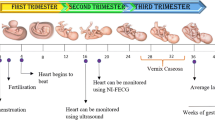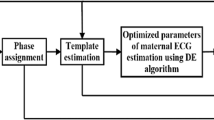Abstract
The principal source of the fetal electrocardiogram (FECG) signal valuation is noted for scientific examination and also related to biomedical applications. A great requirement in fetal monitoring is the extraction or diagnosis of the FECG signal from the highly developed methodologies of composite abdominal impulses. The efficiency of an access procedure is exposed using the methodological evaluation which supports the deep facts of fetal ECG which gives useful data. In this survey, research-revealed methods to extract the FECG signals are reviewed. The use of an adaptive filter in the abdominal ECG signal provides an efficient and effective mode of FECG signal extraction. Similarly, the effectiveness of the FECG extraction can be improved through different methodologies. In this document, the most modern investigations related to the FECG extraction are effectively analyzed and briefed on so as to effectively furnish the traits and classifications. The performance of each FECG extraction technique is confirmed quantitatively by working out SNR and PRD. From the effects, we can make out that the proposed algorithm can be efficiently employed for extracting fetal ECG from abdominal signals.






Similar content being viewed by others
References
Ahmed S, Ali X (2011) A novel technique for extraction foetal electrocardiogram using adaptive filtering and simple genetic algorithm, pp 75–81
Amin MS, Mamun M, Hashim FH, Husain H (2011) Separation of fetal electrocardiography (ECG) from composite ECG using adaptive linear neural network for fetal monitoring. Int J Phys Sci 6(24):5871–5876
Castillo E, Morales DP, Botella G, García A, Parrilla L, Palma AJ (2013) Efficient wavelet-based ECG processing for single-lead FHR extraction. Digit Signal Proc 23:1897–1909
Desai KD, Sankhe MS (2012) A real-time fetal ECG feature extraction using multiscale discrete wavelet transform. In: 5th International conference on bio medical engineering and informatics
Dhage N, Madhe S (2014) An automated methodology for FECG extraction and fetal heart rate monitoring using independent component analysis. In: IEEE international conference on advanced communication control and computing technologies
Gupta P, Sharma KK, Joshi SD (2016) Fetal heart rate extraction from abdominal electrocardiograms through multivariate empirical mode decomposition. Comput Biol Med 68:121–136
Jagannath DJ, Immanuel Selvakumar A (2015) Superior foetal electrocardiogram signal elicitation using a novel artificial intelligent bayesian methodology. Appl Soft Comput 37:1002–1017
Jagannatha DJ, Immanuel Selvakumar A (2014) Issues and research on foetal electrocardiogram signal elicitation. Biomed Signal Process Control 10:224–244
Karmakar C, Kimura Y, Palaniswami M, Khandoker A (2015) Analysis of fetal heart rate asymmetry before and after 35 weeks of gestation. Biomed Signal Process Control 21:43–48
Karvounis EC, Tsipouras MG, Papaloukas C, Tsalikakis DG, Naka KK, Fotiadis DI (2010) A non-invasive methodology for fetal monitoring during pregnancy. Methods Inform Med 49:238–253
Luo D (2012) Research and application of fetal electrocardiogram blind signal separation technology. Res J Appl Sci Eng Technol 4(14):231–2235
Maier C, Dickhaus H (2014) Extraction of respiratory myogram interference from the ECG and its application to characterize sleep-related breathing disorders in atrial fibrillation. J Electrocardiol 47:826–830
Morales DP, García A, Castillo E, Carvajal MA, Parrilla L, Palma AJ (2013) An application of reconfigurable technologies for non-invasive fetal heart rate extraction. Med Eng Phys 35:1005–1014
Nasiri M, Faez K, Nasrabadi AM (2011) A new method for extraction of fetal electrocardiogram signal based on adaptive nero-fuzzy inference system. In: IEEE international conference on signal and image processing applications
Nasiri M, Faez K, Nasrabadi AM (2011) A new method for elicitation of fetal electrocardiogram signal based on adaptive nero-fuzzy inference system. In: IEEE international conference on signal and image processing applications ICSIPA, pp 456–461
Nasiri M, Faez K, Motie A (2012) Fetal electrocardiogram signal elicitation by ANFIS trained with PSO method. Int J Electric Comput Eng 2:247–260
Niknazar M, Rivet B, Jutten C (2012) Fetal ECG extraction by extended state Kalman filtering based on single-channel recordings. IEEE Trans Biomed Eng 60(5):1345–1352
Prasanth K, Paul B, Balakrishnan AA (2013) Fetal ECG extraction using adaptive filters. Int J Adv Res Electric Electron Instrument Eng 2(4):1483–1487
Rahman MZU, Shaik RA, Rama Koti Reddy DV (2011) Efficient sign based normalized adaptive filtering techniques for cancelation of artifacts in ECG signals: application to wireless biotelemetry. Signal Process 91:225–239
Raja CG, Harsha VS, Gowthami BS, Sunitha R (2015) Virtual instrumentation based fetal ECG extraction. In: 4th International conference on eco-friendly computing and communication systems, procedia computer science, vol 70, pp 289–295
Romero I (2010) PCA-based noise reduction in ambulatory ECGs. Comput Cardiol 37:677–680
Ruffo M, Cesarelli M, Romano M, Bifulco P, Fratini A (2010) An algorithm for FHR estimation from foetal phonocardiographic signals. Biomed Signal Process Control 5:131–141
Salmelin A, Wiklund I, Bottinga R, Brorsson B, Ekman-Ordeberg G, Grimfors EE, Persson E (2013) Fetal monitoring with computerized ST analysis during labor: a systematic review and meta-analysis. Acta Obstet Gynecol Scand 92:28–39
Sargolzaei A, Faez K, Sargolzaei S (2011) A new method for foetal electrocardiogram elicitation using adaptive nero-fuzzy interference system trained with PSO algorithm. In: IEEE international conference on signal and image processing applications ICSIPA, pp 1–5
Stampalija T, Casati D, Montico M, Sassi R, Rivolta MW, Maggi V, Ferrazzi E (2015) Parameters influence on acceleration and deceleration capacity based on trans-abdominal ECG in early fetal growth restriction at different gestational age epochs. Eur J Obstet Gynecol Reprod Biol 188:104–112
Swarnalatha R, Prasad DV (2010) A novel technique for extraction of FECG using multistage adaptive filtering. J Appl Sci 10(4):319–324
Vijila CKS, Kanagasabapathy P, Johnson S (2005) Adaptive neuro fuzzy inference system for extraction of FECG. In: Proceedings of IEEE India annual conference, pp 224–227
Vullings R, De Vries B, Bergmans JWM (2011) An adaptive kalman filter for ECG signal enhancement. IEEE Trans Biomed Eng 58:1094–1103
Wen X, Luo D (2012) Performance comparison research of the FECG signal separation based on the BSS algorithm. Res J Appl Sci Eng Technol 4(16):2800–2804
Wu S, Shen Y, Zhou Z, Lin L, Zeng Y, Gao X (2013) Research of fetal ECG extraction using wavelet analysis and adaptive filtering. Comput Biol Med 43(10):1622–1627
Yin Y, Ye M, Ren D, Zhu Y, Yang C (2010) FECG extraction using Bayesian inference and neural networks approximation. J. Comput Inform Syst 6:1769–1778
Author information
Authors and Affiliations
Corresponding author
Ethics declarations
Conflict of interest
The authors declare that they have no conflict of interest.
Additional information
Communicated by V. Loia.
Publisher's Note
Springer Nature remains neutral with regard to jurisdictional claims in published maps and institutional affiliations.
Rights and permissions
About this article
Cite this article
Mohammed Kaleem, A., Kokate, R.D. A survey on FECG extraction using neural network and adaptive filter. Soft Comput 25, 4379–4392 (2021). https://doi.org/10.1007/s00500-020-05447-w
Published:
Issue Date:
DOI: https://doi.org/10.1007/s00500-020-05447-w




